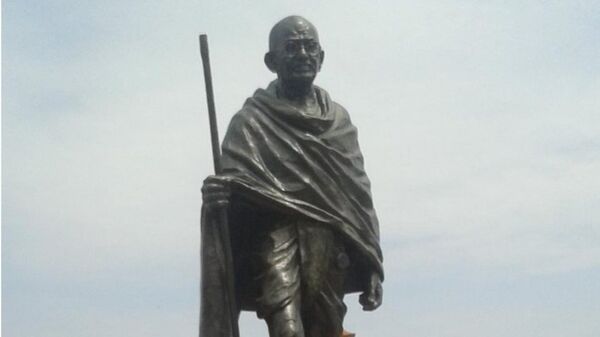Twenty-first century Indians are attracted towards consumerism and glitz, and are wantonly indulgent about waste, A. Annamalai, Director of the New Delhi-based National Gandhi Museum said.
He was speaking as India gets set to celebrate Mahatma Gandhi’s 150th birth anniversary on Wednesday (2 October).
“Our society presently is bedevilled by confusion. The need of the hour is for individual consciousness to be developed. The thought process should be ‘simplicity is what I need and not what I have or want’. We have to be simple to ensure human sustainability,” he said.
Annamalai emphasised when most in India are aware that resources are limited and necessarily have to be spread out to meet the needs of the huge population, there cannot be unlimited growth.
“You need to know when to stop. If you don’t limit yourself, nature will. Instead of handing over a fish to a person every day, teach him or her how to fish. The government shouldn’t be providing everything. However, an environment should be created to facilitate reasonable growth,” he said.
Annamalai further said that landmark schemes like “Make in India”, “Clean India” and “Digital India” were welcome initiatives of the government, but efforts must be concentrated on promoting indigenous products, nurturing homegrown talent and expertise, and technologies.
“To call people from outside India to develop and grow is not necessarily a positive step. Having a liberalised economy was inevitable, but in the long run our economy will be affected if it isn’t indigenised,” he cautioned.
“We need to understand those coming in are doing so because of the availability of cheap manpower and labour. Profit is their only motive,” he added.
On Mahatma Gandhi’s relevance in modern 21st century India, Annamalai said: “Gandhi is still relevant, there are no second thoughts about it. His way of life, his philosophy is relevant even today.”
“There are differences across the board. We must appreciate the beauty of our differences and go forward as one force – unity in diversity. Inclusiveness is the key. We must redirect our efforts to improve the lot of marginalised sections of our society; help them to join the mainstream to ensure both social and religious harmony. This was something very dear to Mahatma Gandhi,” he added.
Indian politicians, irrespective of party affiliation, needed to reassess whether the paths they were following were of benefit to the nation, he said, adding that Gandhi favoured decentralisation of power, power to the people and power to the villages.
“Grass-root institutions like Panchayats (village self-government bodies) should have the right to control their (villagers) own destinies. Currently, orders are coming top-down instead of the other way which is not right,” Annamalai said.
“We have very good programmes. Where we lack is in implementation. Democracy is our strength, should be preserved while giving space to opponents to express dissent. Gandhi was always in favour of giving space to his opponents to express their views,” he added.
Referring to the “Clean India” initiative, Annamalai said: “It is very good that it has happened. Awareness is spreading but we still have a long way to go. Sustainability is key.”
Speaking of India’s youth, he said: Our education system needs to be strengthened and should not be linked to or with employment. When you talk of employability, you lose your chance to acquire a relevant education. It is good that youngsters are now more independent and self-confident, but if you want to climb up, you have to take many U-turns and safety precautions.”
“The 150th birth anniversary of Mahatma Gandhi should be seen again as an opportunity to take some aspect of Gandhi and seek its assimilation in every section of society,” he concluded.

